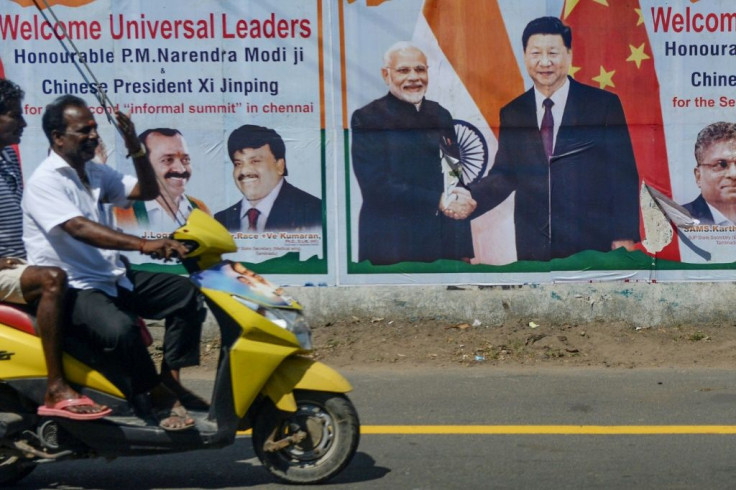Some Voices In India Calling For Boycott Of Chinese Products Over Coronavirus

KEY POINTS
- Indians have also criticized substandard virus testing kits China has sent to the country
- Indians have also pointed to unfair trade practices by the Chinese
- In fiscal 2019, China was India’s second-largest trade partner
A chorus of mostly right-wing and nationalist voices in India are calling for the boycott of Chinese goods as punishment for the coronavirus which is believed to have originated in the central Chinese city of Wuhan. Indians have also pointed to unfair trade practices by the Chinese predating the virus.
Indian officials have also criticized substandard virus testing kits China has sent to the country.
Sanjay Jaiswal, a senior member of India’s ruling Bharatiya Janata Party, or BJP, in the northeastern province of Bihar, urged the Indian public to stop purchasing Chinese products in order to save Indian industry. Jaiswal also supported U.S. President Donald Trump’s call to investigate the World Health Organization for its role in the coronavirus pandemic.
Jaiswal, who is also a trained medical doctor, squarely blamed China for the virus which has now infected 3.5 million people around the world.
“Market access to India [by the Chinese] should not be taken for granted and must be scrutinized on a case by case basis," he said, citing that India still has a huge trade deficit with China.
"China has abused various trade tools of the [World Trade Organization] to capture the global market," he added. "Though India can proudly claim to be the pharmacy of the world, unlike in the past, India now has a crippling dependency on China for APIs [active pharmaceutical ingredients]. Today, about 70% of the Indian API market has closed shop due to predatory pricing by Chinese firms. It's time that we amend this imbalance and revive our industries.”
R.K. Sinha, a former MP for the BJP, took a very harsh view of China and its alleged culpability in the pandemic.
“China has caused immense harm,” he wrote. “Our life is not the same. Our dreams are shattered. Our economy has suffered. Grief has overtaken the entire world.”
Sinha noted that while there may be dispute over whether or not the virus was created in a Chinese lab in Wuhan (as Trump and U.S. Secretary of State Mike Pompeo have claimed), there is no denying that it has spread around the world.
Sinha also cited that since much of the economic life in China has been restarted there are now suspicions that China “was well prepared to deal with the crisis. In other words, it had knowledge about it.”
Sinha demanded that China answer questions about the virus and its subsequent spread. He also cited the fact that the Chinese usually side with Pakistan, India’s arch enemy, in most geopolitical conflicts.
The economic wing of the far-right Rashtriya Swayamsevak Sangh, or RSS, has already commenced a campaign to boycott Chinese goods.
The group, called the Swadeshi Jagran Manch, or SJM, has long called for a Chinese boycott, but now the pandemic has given the cause a new push.
Ashwani Mahajan, the national co-convenor of SJM said the lockdown in India and subsequent economic hardship and job losses were caused by the "Chinese virus.”
"Economic activities of all types are getting impacted, causing huge loss to our economy and economies all around the world,” he added. "We will work towards encouraging [Indian] industries, big and small, by boycotting Chinese [products] and purchasing [Indian] products and bring prosperity back to our country.”
Even a prominent cricketer, Harbhajan Singh, has called for a boycott of China.
“High time we should boycott them, we are good enough to make our own things,” he tweeted.
https://www.dailypioneer.com/2020/state-editions/locals-consider-boycotting-chinese-products-after-lockdown.html
Some ordinary Indian businessmen also support a boycott of China.
Ram Singh Kohli, a toy and gift store owner in Rajpur in the state of Madhya Pradesh said: “More than 40% of the gifts and toys are generally imported from China because the made- in-India products are costlier and the customers prefer cheaper products. But considering China’s… role in the pandemic and its negative impact on the economy of several countries, I am not going to import any Chinese products.”
Ruchika Bhalla, a resident of Karnpur, said: “I have always preferred to buy made-in-India products but now is… high time when everyone should stop buying any Chinese products, especially during the festivals like Diwali and Holi. Everyone should buy Indian products and contribute to making our economy strong.”
However, some observers assert that most consumers will buy the cheaper product, regardless of its origin.
"Some people might claim currently that they will not buy Chinese products anymore but generally the customers prefer inexpensive products no matter where those are manufactured," said shopkeeper Sanam Ali.
Even before the pandemic arose, most Indians held negative views of China, According to Pew Research, a majority of Indians (61%) saw a growing Chinese economy as a bad development for their own country.
An online survey by the Takshashila Institution, an independent think tank based in Bangalore, revealed that two-thirds of respondents directly blamed China for the Covid-19 pandemic.
However, the opinions on the ground do not necessarily influence government policy. Virtually every nation on earth does business with China – in fiscal 2019, China was India’s second-largest trade partner and has been the fastest-growing source of Foreign Direct Investment in India over the last five years.
However, in April, the Indian government sought to curb Chinese FDI into India by requiring certain countries (i.e., those which share a land border with India) to apply for approval from the Indian government for their purchases of Indian firms. The restrictions were designed to stamp out “opportunistic” investments. Beijing protested, citing the rule broke WTO principles.
Not everyone in India agreed with this stance, citing that India’s own economy is slowing and that it needs Chinese funds.
© Copyright IBTimes 2025. All rights reserved.





















